八下单词unit1
八年级下册英语单词表(Unit 1)人教版
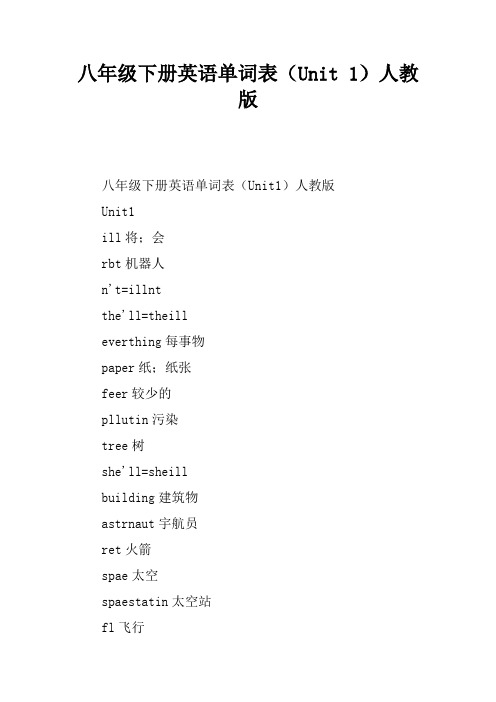
八年级下册英语单词表(Unit 1)人教版八年级下册英语单词表(Unit1)人教版Unit1ill将;会rbt机器人n't=illntthe'll=theilleverthing每事物paper纸;纸张feer较少的pllutin污染tree树she'll=sheillbuilding建筑物astrnaut宇航员ret火箭spae太空spaestatin太空站fl飞行t动词tae的过去式n月亮;月球I'll=Iillfall落下fell动词fall的过去式fallinlveith爱上alne单独地pet宠物parrt鹦鹉prbabl大概gsating去滑冰suit一套衣服able能够beablet有能力做某事dress穿衣asuall随意地hih哪个even甚至therldup世界杯rte动词rite的过去式self我自己intervie面试predit预言preditin预测ae动词e的过去式etrue实现sund声音pan公司thught动词thin的过去式strateg策略fitin小说unpleasant使人不愉快的sientist科学家inthefuture未来hundredsf大量alread早已ade动词ae的过去式fatr工厂siple简单的suh这样的bred厌烦的everhere各地;到处huan人类shape外形huge巨大的earthquae地震snae蛇pssible可能的eletri导电的tthbrush牙刷see似乎ipssible不可能的huser家务rating级别Alexis亚历克西斯。
八下英语unit1重点单词详解
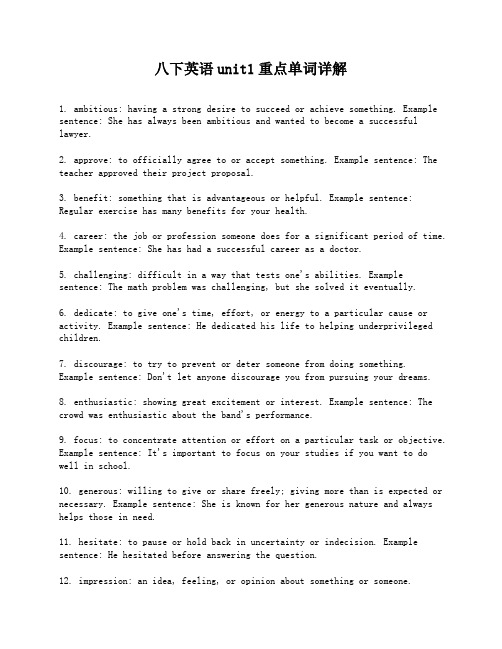
八下英语unit1重点单词详解1. ambitious: having a strong desire to succeed or achieve something. Example sentence: She has always been ambitious and wanted to become a successful lawyer.2. approve: to officially agree to or accept something. Example sentence: The teacher approved their project proposal.3. benefit: something that is advantageous or helpful. Example sentence: Regular exercise has many benefits for your health.4. career: the job or profession someone does for a significant period of time. Example sentence: She has had a successful career as a doctor.5. challenging: difficult in a way that tests one's abilities. Example sentence: The math problem was challenging, but she solved it eventually.6. dedicate: to give one's time, effort, or energy to a particular cause or activity. Example sentence: He dedicated his life to helping underprivileged children.7. discourage: to try to prevent or deter someone from doing something. Example sentence: Don't let anyone discourage you from pursuing your dreams.8. enthusiastic: showing great excitement or interest. Example sentence: The crowd was enthusiastic about the band's performance.9. focus: to concentrate attention or effort on a particular task or objective. Example sentence: It's important to focus on your studies if you want to do well in school.10. generous: willing to give or share freely; giving more than is expected or necessary. Example sentence: She is known for her generous nature and always helps those in need.11. hesitate: to pause or hold back in uncertainty or indecision. Example sentence: He hesitated before answering the question.12. impression: an idea, feeling, or opinion about something or someone.Example sentence: The first impression is often the most important when meeting new people.13. journey: a long trip or travel from one place to another. Example sentence: They embarked on a journey to explore different countries.14. knowledge: information, understanding, or skills acquired through experience, education, or training. Example sentence: She has extensive knowledge of ancient history.15. leisure: free time when one is not working or occupied. Example sentence: She enjoys reading during her leisure time.16. opportunity: a chance or favorable occasion for doing something. Example sentence: He seized the opportunity to showcase his talents.17. persuade: to convince someone to do or believe something through reasoning or argument. Example sentence: She tried to persuade her parents to let her go on the school trip.18. resist: to withstand the action or effect of something; to refuse to give in to or be affected by. Example sentence: He resisted the temptation to eat the cake.19. sensible: having or showing good judgment or common sense. Example sentence: It would be sensible to bring an umbrella as it might rain.20. unique: being the only one of its kind; unlike anything else. Example sentence: Each snowflake is unique in its shape and design.21. accomplish: to achieve a goal or complete a task. Example sentence: She worked hard and was able to accomplish her dream of running a marathon.22. competitive: having a desire to win and be better than others. Example sentence: He's very competitive and always tries to be the best.23. contribute: to give something, such as money, effort, or ideas, to a common cause or project. Example sentence: Everyone contributed to the success of the fundraising event.24. creativity: the ability to create or invent something original or imaginative. Example sentence: She has a great creativity and comes up with unique ideas for her artwork.25. diverse: made up of or encompassing a range of elements, opinions, or groups. Example sentence: The school's student body is diverse, with students from many different countries.26. efficient: able to accomplish a task with the least amount of time, money, or effort. Example sentence: The new software has made our work more efficient.27. flexible: able to be changed or adapted easily. Example sentence: It's important to be flexible when planning a trip, as unexpected things can happen.28. inspire: to fill someone with the desire to do something or to create something. Example sentence: She was inspired by her teacher to pursue acareer in music.29. justify: to provide a reason or argument for something, especially onethat defends or explains it. Example sentence: The company had to justify the increase in prices to its customers.30. maintain: to keep something in good condition or keep it running smoothly. Example sentence: Regular maintenance can prevent problems with your car.31. manipulate: to handle or control something skillfully or cleverly. Example sentence: The magician manipulated the cards in a way that looked impossible.32. motivate: to encourage someone to do something or to inspire them to do it. Example sentence: The coach motivated the team to win the game.33. negotiate: to discuss and reach an agreement about something with someone. Example sentence: They negotiated a deal with the seller to buy the house.34. overwhelmed: feeling like you are unable to cope with something or that something is too difficult. Example sentence: She felt overwhelmed by the amount of work she had to do.35. prioritize: to decide that one thing is more important than another and should be done first. Example sentence: It's important to prioritize yourtasks and finish them in order.36. subjective: based on personal opinion or feelings rather than facts or evidence. Example sentence: Art is subjective, and different people can have different interpretations of the same painting.37. tolerate: to put up with something, even if you do not like it. Example sentence: She has a strong stomach and can tolerate spicy food.38. versatile: able to adapt or be used for different activities or purposes. Example sentence: The actor is versatile and can play a wide range of roles. 39. vital: extremely important and necessary for life or survival. Example sentence: Clean water is vital for human beings to survive.40. withstand: to resist and not be defeated or destroyed by something. Example sentence: The tree withstood the strong wind and heavy rain.41. adapt: to change or make adjustments in order to fit a new situation or environment. Example sentence: He has adapted well to the new work schedule.42. admire: to have a high opinion of someone or something and to respect them. Example sentence: We all admire our teacher for her hard work and dedication.43. affect: to have an influence on or change the state or behavior of someone or something. Example sentence: The new law will affect how businesses operate.44. achieve: to successfully complete something or reach a goal. Example sentence: With hard work, she achieved her goal of passing the exam.45. acknowledge: to show that you recognize the existence, truth, or importance of something. Example sentence: He acknowledged the mistake he had made.46. adjust: to make changes to something or find a way of dealing with a new situation that is satisfactory. Example sentence: We had to adjust to the new time zone.47. advance: to move forward or progress in a career, development, or education. Example sentence: She advanced to the next round of the competition.48. advocate: to publicly support or argue for an idea, policy, or cause. Example sentence: He is an advocate for environmental protection.49. align: to cause to be in a straight line or in the correct position. Example sentence: The planets align in a rare conjunction.50. annotate: to provide a comment or explanation about something, often in a marginal note. Example sentence: She annotated the text to provide further insight.51. appreciate: to recognize the value or quality of something and to enjoy it. Example sentence: I appreciate your help and support.52. assign: to give someone a task, duty, or responsibility. Example sentence: The teacher assigned a research paper to the students.53. aspect: a particular feature, part, or attribute of something. Example sentence: Education is an important aspect of personal development.54. assess: to evaluate or judge the value, importance, or quality of something. Example sentence: The doctor assessed the patient's condition.55. assign: to give someone a task, duty, or responsibility. Example sentence: The teacher assigned a research paper to the students.56. aspect: a particular feature, part, or attribute of something. Example sentence: Education is an important aspect of personal development.57. assess: to evaluate or judge the value, importance, or quality of something. Example sentence: The doctor assessed the patient's condition.58. attend: to be present at an event or occasion, or to give your attentionto something. Example sentence: He attended the conference to learn new ideas.59. attitude: a feeling or opinion about something or someone, or a way of behaving. Example sentence: A positive attitude can help you overcome challenges.60. audit: to carefully check and examine the records, accounts, or procedures of an organization or person. Example sentence: The company's accounts were audited last year.。
人教英语八下第一单元单词表
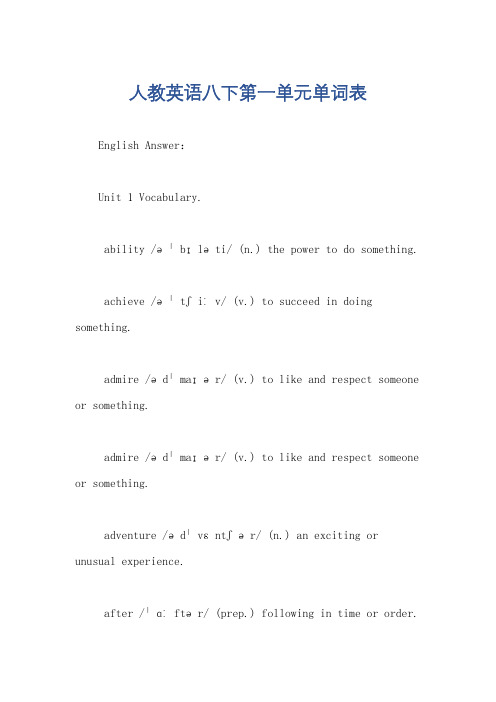
人教英语八下第一单元单词表English Answer:Unit 1 Vocabulary.ability /əˈbɪləti/ (n.) the power to do something.achieve /əˈtʃiːv/ (v.) to succeed in doing something.admire /ədˈmaɪər/ (v.) to like and respect someone or something.admire /ədˈmaɪər/ (v.) to like and respect someone or something.adventure /ədˈvɛntʃər/ (n.) an exciting or unusual experience.after /ˈɑːftər/ (prep.) following in time or order.age /eɪdʒ/ (n.) the length of time that someone or something has lived.appear /əˈpɪər/ (v.) to come into sight.be able to /biːˈeɪbəl tuː/ (v.) to have the ability to do something.become /bɪˈkʌm/ (v.) to change to a new state or condition.begin /bɪˈgɪn/ (v.) to start.being /ˈbiːɪŋ/ (n.) the state or fact of existing.better /ˈbɛtər/ (adj.) more good or satisfactory.break /breɪk/ (v.) to separate or become separated into pieces.bright /braɪt/ (adj.) shining with a clear, stronglight.bring /brɪŋ/ (v.) to take someone or something with you to a place.build /bɪld/ (v.) to make something by putting parts together.busy /ˈbɪzi/ (adj.) having a lot to do.but /bʌt/ (conj.) used to introduce a contrast or exception.by /baɪ/ (prep.) near or beside someone or something.call /kɔːl/ (v.) to speak to someone on the phone.can /kæn/ (modal v.) to be able to.carry /ˈkæri/ (v.) to hold and move something from one place to another.change /tʃeɪndʒ/ (v.) to become different.clean /kliːn/ (adj.) free from dirt or impurities.clear /klɪər/ (adj.) easy to see or understand.close /kloʊz/ (v.) to move something so that it covers or blocks an opening.come /kʌm/ (v.) to move towards or reach a place.compare /kəmˈpeər/ (v.) to examine the similarities and differences between two or more things.computer /kəmˈpjuːtər/ (n.) a machine that can be programmed to carry out series of arithmetic or logical operations automatically.continue /kənˈtɪnyuː/ (v.) to do or keep doing something without stopping.cook /kʊk/ (v.) to prepare food by heating it.cool /kuːl/ (adj.) slightly cold.could /kʊd/ (modal v.) to be able to.count /kaʊnt/ (v.) to find out how many there are of something.cover /ˈkʌvər/ (v.) to put something over something else to protect or hide it.create /kriˈeɪt/ (v.) to bring something new into existence.中文回答:第一单元单词表。
英语八下第一单元单词

英语八下第一单元单词英语八年级下册第一单元的单词列表:matter - 问题,事情sore - 疼痛的have a cold - 感冒stomachache - 胃痛,腹痛have a stomachache - 胃痛foot - 脚neck - 脖子stomach - 胃temperature - 温度,体温rest - 休息honey - 蜂蜜dentist - 牙医should - 应该headache - 头痛shouldn't = should not - 不应该ago - 以前so - 如此,这么illness - 疾病advice - 建议thirsty - 口渴的stress - 压力be stressed out - 紧张的,有压力的crisp - 脆的herb - 草药angry - 生气的,愤怒的tofu - 豆腐moss - 苔藓body - 身体mind - 头脑,思维traditional - 传统的balance - 平衡yin - 阴(中医理论中的概念)yang - 阳(中医理论中的概念)weak - 虚弱的get tired - 变得疲劳energy - 能量be full of energy - 充满活力balanced diet - 平衡饮食early - 早的,早期的problem - 问题way - 方法,方式traditional Chinese doctors - 中医believe - 相信balance of yin and yang - 阴阳平衡weak yin - 阴虚weak yang - 阳虚hot - 热的cold - 冷的herb - 草药angry - 愤怒的,生气的herbal tea - 草药茶gentle - 温和的get angry easily - 容易发怒too much - 太多too little - 太少in balance - 平衡Chinese medicine - 中医now - 现在western medicine - 西医Western countries - 西方国家become - 变成以上这些单词涵盖了八年级下册第一单元的主要词汇,它们涉及到健康问题、疾病、建议、情绪、中医理论等多个方面。
8下英语第一单元单词

8下英语第一单元单词Unit 1matter n.问题;事情What's the matter?怎么了?出什么事了?sore adj.疼痛的;酸痛的have a cold 感冒stomachache n.胃痛:腹痛have a stomachache 胃痛foot n.脚;足neck n.领;脖子stomach n.胃;腹部throat n.咽喉;喉咙fever n.发烧lie v.(lay)躺;平躺lie down 躺下rest n.放松;休息cough n.&v.咳嗽X-ray n.X射线;X光toothache n.牙痛take one's temperature 量体温headache n.头痛have a fever 发烧break n.间歇;休息take breaks (take a break)休息hurt v.(使)疼痛;受伤passenger n.乘客;旅客off adv.&prep.离开(某处);不工作;从……去掉get off 下车to one’s surprise 使……惊讶的是;出乎……的意料onto prep.向;朝trouble n.问题,苦恼hit v.(hit)(用手或器具)击;打right away 立即;马上get into 陷入;参与herself pron.(she的反身代词)她自己bandage n.绷带 v.用绷带包扎press v.压;挤;按sick adj.生病的;有病的knee n.膝;膝盖nosebleed n.鼻出血breathe v.呼吸sunburned adj.晒伤的ourselves pron.(we的反身代词)我们自己climber n.登山者;攀登者be used to 习惯于……;适应于……risk n.&v.危险;风险;冒险take risks(take a risk)冒险accident n.(交通)事故;意外遭遇situation n情况;状况kilo(=kilogram) n.千克;公斤rock n.岩石run out(of)用尽;耗尽knife n.(pl.Knives)刀cut of 切除blood n.血mean v.(meant)意思是;打算;意欲get out of 离开;从……出来importance n.重要性;重要decision n.决定;抉择control n.&v.限制;约束;管理be in control of 掌管;管理spirit n.勇气;意志death n.死;死亡give up 放弃nurse n.护士Judy 朱迪(女名)Nancy 南希(女名)Mandy 曼迪(女名)Aron Ralston 阿伦·罗尔斯顿Utah 犹他州(美国)。
八年级下册第1单元单词

人教版八年级下册unit1单词序号 英文 中文序号 英文 中文1matter/ˈmætə(r)/n.问题;事情25off/ɒf/adv.&prep.离开(某处);不工作;从……去掉2What’s the matter?怎么了?出什么事了?26get off下车3sore/sɔː(r)/adj.疼痛的;酸痛的27to one's surprise使……惊讶的是;出乎……的意料4have a cold感冒28onto/ˈɒntə/prep.向;朝5stomachache/ˈstʌməkeɪk/n.胃痛;腹痛29trouble/ˈtrʌbl/n.问题;苦恼6have a stomachache胃痛30hit/hɪt/v.(用手或器具)击;打7foot/fʊt/n.脚;足31right away立即;马上8neck/nek/n.颈;脖子32get into陷入;参与9stomach/ˈstʌmək/n.胃;腹部33herself/hɜːˈself/pron.(she的反身代词)她自己10throat/θrəʊt/n.咽喉;喉咙34bandage/ˈbændɪdʒ/n.绷带11fever/ˈfiːvə(r)/n.发烧35bandage/ˈbændɪdʒ/v.用绷带包扎12lie/laɪ/v.躺;平躺36press/pres/v.压;挤;按13lie down躺下37sick/sɪk/adj.生病的;有病的14rest/rest/v.&n.放松;休息38knee/niː/n.膝;膝盖15cough/kɒf/n.&v.咳嗽39nosebleed/ˈnəʊzbliːd/n.鼻出血16X-ray/ˈeks reɪ/n.X射线;X光40breathe/briːð/v.呼吸17toothache/ˈtuːθeɪk/n.牙痛41sunburned/ˈsʌnbɜːnd/adj.晒伤的18take one's temperature量体温42ourselves/ɑːˈselvz/pron.(we的反身代词)我们自己19headache/ˈhedeɪk/n.头痛43climber/ˈklaɪmə(r)/n.登山者;攀登者20have a fever发烧44be used to习惯于…… ;适应于……21break/breɪk/n.间歇;休息45risk/rɪsk/n.&v.风险;危险;冒险22take breaks(take a break)休息46take risks(take a risk)冒险23hurt/hɜːt/v.(使)疼痛;受伤47accident/ˈæksɪdənt/n.意外遭遇;(交通)事故24passenger/ˈpæsɪndʒə(r)/n.乘客;旅客48situation/ˌsɪtʃuˈeɪʃn/n.状况;情况序号 英文 中文序号 英文 中文49kilo/ˈkiːləʊ/n.(=kilogram)公斤;千克60be in control of掌管,管理50rock/rɒk/n.岩石61spirit/ˈspɪrɪt/n.勇气,意志51run out (of)用尽;耗尽62death/deθ/n.死;死亡52knife/naɪf/n.(pl.knives)刀63give up放弃53cut off切除64nurse/nɜːs/n.护士54blood/blʌd/n.血65Judy/ˈdʒuːdi/朱迪(女名)55mean/miːn/v.打算,意思是,意欲66Nancy/ˈnænsi/南希(女名)56get out of离开,从……出来67Mandy/ˈmændi/曼迪(女名)57importance/ɪmˈpɔːtns/n.重要性;重要68Aron Ralston阿伦·罗尔斯顿58decision/dɪˈsɪʒn/n.决定;抉择69Utah/ˈjuːtɑː/尤他州(美国)59control/kənˈtrəʊl/n.&v.限制;约束;管理70。
八下英语1到3重点单词和短语
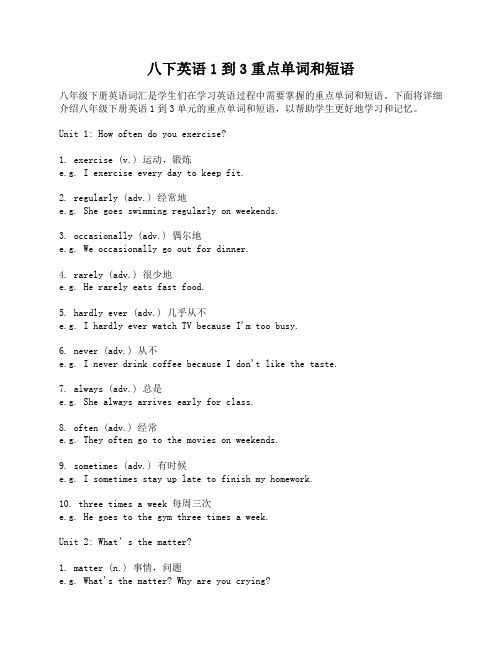
八下英语1到3重点单词和短语八年级下册英语词汇是学生们在学习英语过程中需要掌握的重点单词和短语。
下面将详细介绍八年级下册英语1到3单元的重点单词和短语,以帮助学生更好地学习和记忆。
Unit 1: How often do you exercise?1. exercise (v.) 运动,锻炼e.g. I exercise every day to keep fit.2. regularly (adv.) 经常地e.g. She goes swimming regularly on weekends.3. occasionally (adv.) 偶尔地e.g. We occasionally go out for dinner.4. rarely (adv.) 很少地e.g. He rarely eats fast food.5. hardly ever (adv.) 几乎从不e.g. I hardly ever watch TV because I'm too busy.6. never (adv.) 从不e.g. I never drink coffee because I don't like the taste.7. always (adv.) 总是e.g. She always arrives early for class.8. often (adv.) 经常e.g. They often go to the movies on weekends.9. sometimes (adv.) 有时候e.g. I sometimes stay up late to finish my homework.10. three times a week 每周三次e.g. He goes to the gym three times a week.Unit 2: What’s the matter?1. matter (n.) 事情,问题e.g. What's the matter? Why are you crying?2. feel (v.) 感觉e.g. I feel tired after a long day at work.3. headache (n.) 头痛e.g. I have a terrible headache.4. stomachache (n.) 胃痛e.g. She couldn't eat because of the stomachache.5. toothache (n.) 牙痛e.g. He went to the dentist because of a toothache.6. sore throat (n.) 喉咙痛e.g. I can't speak because I have a sore throat.7. runny nose (n.) 流鼻涕e.g. My sister has a runny nose and can't stop sneezing.8. cough (v.) 咳嗽e.g. He has been coughing all night.9. sneeze (v.) 打喷嚏e.g. I always sneeze when I'm allergic to something.10. take medicine 吃药e.g. You should take some medicine for the pain.Unit 3: What are you doing for vacation?1. vacation (n.) 假期,度假e.g. I'm going on vacation to the beach next week.2. trip (n.) 旅行e.g. We went on a trip to Paris last summer.3. camp (n.) 露营e.g. I went to summer camp and had a great time.4. stay (v.) 停留,逗留e.g. We stayed in a hotel during our vacation.5. visit (v.) 参观,访问e.g. They visited the Great Wall during their trip to China.6. hike (v.) 徒步旅行,远足e.g. We hiked in the mountains for the whole day.7. swim (v.) 游泳e.g. She loves to swim in the ocean.8. explore (v.) 探索,寻找e.g. We explored the ancient ruins and learned a lot.9. relax (v.) 放松e.g. I like to relax on the beach and read a book.10. have fun 玩得开心e.g. We had a lot of fun at the amusement park.Unit 4: What’s your favorite sport?1. sport (n.) 运动e.g. Basketball is my favorite sport.2. basketball (n.) 篮球e.g. The NBA is the highest professional basketball league in the world.3. soccer (n.) 足球e.g. The World Cup is the most watched sports event in the world.4. tennis (n.) 网球e.g. Roger Federer is one of the greatest tennis players of all time.5. volleyball (n.) 排球e.g. The USA women's volleyball team is a powerhouse in the sport.6. running (n.) 跑步e.g. The marathon is one of the longest running races.7. cycling (n.) 骑自行车e.g. The Tour de France is the most famous cycling race.8. swimming (n.) 游泳e.g. Michael Phelps is the most decorated Olympian in history.9. skiing (n.) 滑雪e.g. The Winter Olympics showcase the best in skiing and other winter sports.10. surfing (n.) 冲浪e.g. Surfing is a popular sport on the beaches of Hawaii.Unit 5: What are you going to be when you grow up?1. doctor (n.) 医生e.g. My dream is to become a doctor and help people.2. teacher (n.) 老师e.g. Teachers play a crucial role in shaping the minds of young students.3. engineer (n.) 工程师e.g. Engineers design and build the structures that make modern life possible.4. lawyer (n.) 律师e.g. Lawyers work to ensure justice and protect the rights of their clients.5. artist (n.) 艺术家e.g. Artists use their creativity to express themselves through various forms of art.6. musician (n.) 音乐家e.g. Musicians create and perform music that can touch the hearts of many.7. scientist (n.) 科学家e.g. Scientists study the world around us to uncover new knowledge and solve problems.8. astronaut (n.) 宇航员e.g. Astronauts travel into space to conduct research and explore the final frontier.9. firefighter (n.) 消防员e.g. Firefighters risk their lives to save others and protect property from fire.10. police officer (n.) 警察e.g. Police officers work to maintain public safety and enforce laws.以上是八年级下册英语1到3单元的重点单词和短语。
八年级下册英语单词表unit1--unit2

Unit1will v.将;会;要robot n.机器人机器人won’t=will noteverything pron.每件事物paper n.纸;纸张fewer adj.(few的比较级)较少的;较少数pollution n.污染tree n.树;树木she’ll=she willbuilding n.建筑物;房屋astronaut n.宇航员,航天员rocket n.火箭space n.空间;太空space station 空间站fly v.飞行took v. take的过去式moon n.月亮;月球will=i’llfall v.落下;跌落;变为fell v.fall的过去式fall in love with 爱上pet 宠物parrot n.鹦鹉probably adv.大概;或许go skating 去滑冰suit n.一套衣服able adj.能, 能够be able to 有能力做某事,会做某事dress v.穿衣casually adv.非正式地;随意地which pron.哪个;哪几个even adv.甚至the world cup 世界杯predict v.预报;预言prediction n.预言;预测came v. come的过去式come true 实现;达到sound n.声音company n.公司thought v. think的过去式fiction n.小说unpleasant adj.使人不愉快的scientist n.科学家in the future 未来,将来hundreds of 大量,许多already adv.早已;先前made v. make的过去式factory n.工厂simple adj.简单的;简易的such adj.这样的;这种bored adj.厌烦的;厌倦的everywhere adv.各地;到处human n.人;人类huge n.巨大的;极大的shape n.外形;形状earthquake n.地震snake n.蛇possible adj.可能的electric adj.电的;导电的toothbrush n.牙刷seem v.像是;似乎impossible adj.不可能的;不会发生的housework n.家务;家务事rating n.级别;等级Alexis 亚历克西丝myself .pron.(反身代词反身代词)我自己;我本人wrote v. write的过去式interview n.面试;面谈unit2keep out 不让……进入play v.播放argue v.争论;争吵wrong adj.错误的;有毛病的;不合适的what’s wrong ? 怎么了?style n.风格out of style 不时髦的,过时的could modal v. can的过去式,可以,应该,可能call sb.up 打电话给……ticket n.票;入场券surprise v.使惊奇;使意外on the phone 用电话交谈;在通话what’s the matter?怎么了?pay for 付款part-time job 兼职工作okay adj.好的either adj. 任一的;(两方中的)每一方的bake v.烤;烘bake sale 面包或糕饼的售卖活动Teen Talk青少年论坛tutor n.家庭教师original adj.新颖的the same as 与……同样的in style 时髦的;流行的haircut n.理发;发型except prep.除;把--除外upset adj.心烦的,沮丧的return v.归还;送回football n.足球until prep.到--为止fit v.适合;适应fit…into…找到时间(做某事)as……as possib le 尽可能……pressure n.压力complain v.抱怨;控诉include v.包括;包含pushy adj.固执己见的;一意孤行的push v.推;推动;督促send v.打发all kinds of 各种;许多compare v.比较crazy adj.疯狂的;狂热的themselves pron.(反身代词)他(她,它)们自己adult n.成年人on the one hand (在)一方面(在)一方面organized adj.有组织的on the other hand (在)另一方面(在)另一方面freedom n.自由fail v.失败Eve 伊芙(女名)Erin 埃琳(女名)Nicole 妮科尔(女名)Emilio 埃米利奥(男名)Alice 艾丽斯(女名)get on 相处;进展didn’t =did not couldn’t =could not。
人教版八年级下册Unit1知识梳理

Unit1 知识梳理【重点单词】matter [ˈmætə] v. 重要,要紧,有关系What’s the matter? 怎么了?出什么事了?sore [sɔ:(r)] adj. 疼痛的,酸痛的have a cold 感冒stomach ['stʌmək] n. 胃,腹部stomachache ['stʌməkeɪk] n. 胃痛,腹痛have a stomachache 胃痛foot(复数feet) [fu:t] n. 脚neck [nek] n. 颈,脖子throat [θrəʊt] n. 喉咙fever ['fi:və] n. 发烧,发热lie [laɪ] v. 躺,平躺lie down 躺下rest [rest] n. 剩余部分,其余;放松,休息cough [kɒf] n. & v. 咳嗽X-ray ['eksreɪ] n. X光,X射线toothache [ˈtu:θeɪk] n. 牙痛take one's temperature 量体温headache [ˈhedeɪk] n. 头痛have a fever 发烧break [breɪk] n. & v. 休息,暂停;打破take breaks (take a break)休息hurt [hə:t] v. 伤害,损害,使受伤passenger ['pæsɪndʒə] n. 乘客,旅客off [ɒf] adv. prep. 离开(某处);从…去掉get off 下车to one's surprise 使…惊讶,出乎…意料onto [ˈɒntə] prep. 向,朝trouble [ˈtrʌbl] n. 麻烦,烦扰,问题hit [hit] n. & v. 碰撞,打,打击right away 立即,马上get into 陷入,参与herself [hə:ˈself] pron. 她自己,她本身(she的反身代词)bandage ['bændɪdʒ] n. & v. 绷带;用绷带包扎sick [sɪk] adj. 患病的,不适的knee [ni:] n. 膝盖nosebleed [ˈnəʊzbli:d] n. 鼻出血breathe [bri:ð] v. 呼吸sunburned [ˈsʌnbɜ:nd] adj. 晒伤的ourselves [ɑ:ˈselvz] pron. 我们自己(we的反身代词)climber [ˈklaɪmə(r)] n. 登山者be used to 习惯于… 适应于…risk [rɪsk] n. & v. 风险,危险;冒险take risks (take a risk) 冒险accident [ˈæksidənt] n. 意外事件;事故situation [ˌsitjuˈeiʃən] n. 状况,形式,情况kg=kilogram [ˈkɪləgræm] n. 公斤,千克rock [rɔk] n. 岩石run out (of) 用尽,耗尽knife [naif] n. 刀,餐刀cut off 切除blood [blʌd] n. 血mean [mi:n] v. 意味着,意思是,意欲get out of 离开,从… 出来importance [ɪmˈpɔ:tns] n. 重要性decision [dɪ'sɪʒn] n. 决心,决定,抉择control [kən'trəʊl] v. 控制,支配,操纵be in control of 掌管,管理spirit ['spɪrɪt] n. 勇气,意志death [deθ] n. 死亡give up 放弃nurse [nə:s] n. 护士【重点短语】1.have a fever 发烧2.have a cough 咳嗽3.have a toothache 牙疼4.talk too much 说得太多5.drink enough water 喝足够的水6.have a cold 受凉;感冒7.have a stomachache 胃疼8.have a sore back 背疼9.have a sore throat 喉咙痛10. take risks 冒险11.hot tea with honey 加蜂蜜的热茶12.see a dentist 看牙医13.get an X-ray 拍X 光片14.take one’ s temperature 量体温15.put some medicine on sth. 在……上面敷药16. give up 放弃17. sound like 听起来像18. all weekend 整个周末19. in the same way 以同样的方式21. go along 沿着……走22. on the side of the road 在马路边23. shout for help 大声呼救24. without thinking twice 没有多想25. get off 下车26. have a heart problem 有心脏病27. to one’ s surprise 另某人惊讶的是28. thanks to 多亏了;由于29. in time 及时30. make a decision 做出决定31. get into trouble 造成麻烦32. right away 立刻;马上33. because of 由于34. get out of 离开;从……出来35. keep on doing sth. 继续或坚持做某事36. put a bandage on sth. 用绷带包扎37. fall down 摔倒38. feel sick 感到恶心39. have a nosebleed 流鼻血40. cut his knee 割伤他的膝盖41. put her head back 把她的头向后仰42. have problems breathing 呼吸困难43. mountain climbing 登山运动44. be used to doing sth. 习惯做某事45. run out (of) 用完;用尽46. so that 以便47. so...that... 如此……以至于...…48. be in control of 掌管;管理49. in a difficult situation 在闲境中【重点句型】1. What's the matter with you?= What'the trouble with you?= What's wrong with you? 你怎么了?2. What should she do? 她该怎么办呢?3.Should I take my temperature? 我应该量一下体温吗?4.You should lie down and rest. 你应该躺下休息一会儿。
八年级下册英语unit1重点单词

八年级下册英语unit1重点单词1. continent (n): a large, continuous mass of land, typically separated by oceans. Example: Africa is the second largest continent in the world.2. immigrant (n): a person who comes to live permanently in a foreign country. Example: My grandparents were immigrants from Italy.3. population (n): the number of people living in a particular area. Example: The population of China is over 1 billion.4. wildlife (n): animals and plants that grow independently in natural conditions. Example: The national park is known for its diverse wildlife.5. climate (n): the weather conditions prevailing in an area in general orover a long period. Example: Australia has a hot and dry climate in most parts of the country.6. remote (adj): situated far from the main centers of population. Example: The village is located in a remote area of the mountains.7. landscape (n): all the visible features of an area of countryside or land. Example: The landscape of the desert is dominated by sand dunes.8. coastline (n): the outline of a coast, especially with regard to its shape and appearance. Example: The coastline of California is famous for itsbeautiful beaches.9. steep (adj): having a sharp rise or fall. Example: The mountain path was very steep and difficult to climb.10. summit (n): the highest point of a hill or mountain. Example: After atiring climb, they finally reached the summit of the mountain.11. accompany (v): go somewhere with someone as a companion. Example: Can you accompany me to the store? I need help carrying the groceries.12. voyage (n): a long journey, especially by sea or in space. Example: The explorers set sail on a voyage to discover new lands.13. fascination (n): a strong attraction or interest in something. Example: I have always had a fascination with ancient history.14. independence (n): the fact or state of being independent. Example: India gained its independence from British rule in 1947.15. enthusiasm (n): intense and eager enjoyment, interest, or approval. Example: The students showed great enthusiasm for the science experiment.16. passionate (adj): having, showing, or caused by strong feelings or beliefs. Example: She has a passionate love for classical music.17. achievement (n): a thing done successfully, typically by effort, courage, or skill. Example: Winning the championship was a great achievement for the team.18. determination (n): the quality of being determined; firmness of purpose. Example: With determination and hard work, she achieved her goal of becoming adoctor.19. reputation (n): the beliefs or opinions that are generally held about someone or something. Example: The restaurant has a good reputation for its delicious food.20. conquer (v): overcome or take control of a place or people by military force. Example: The army managed to conquer the enemy's territory.21. diversity (n): the state of having or being composed of differing or diverse elements. Example: Our class is diverse, with students from various cultural backgrounds.22. culture (n): the ideas, customs, and social behavior of a particularpeople or society. Example: Japanese culture is known for its respect and politeness.23. tradition (n): a long-established custom or practice. Example: The family has a tradition of gathering for dinner on Christmas Eve.24. heritage (n): something that is passed on from one generation to another, such as a tradition, language, or culture. Example: The ancient ruins are a testament to the region's rich cultural heritage.25. exploration (n): the act of searching for new areas, resources, or information. Example: The space agency is planning a mission to explore Mars.26. adventure (n): an unusual and exciting experience or activity. Example: The hiking trip was an adventure filled with breathtaking views andchallenging trails.27. challenge (n): a task or situation that tests someone's abilities. Example: The high school students participated in a challenge to raise funds for charity.28. opportunity (n): a situation or set of circumstances in which somethingcan be done. Example: The job opportunity allowed her to pursue her career in marketing.29. contribution (n): the act of giving or contributing something to a groupor cause. Example: The community's contribution to the fundraising event madea significant impact.30. development (n): the process of growing or becoming larger, more advanced, or more complex. Example: The country's economic development has led to improved living standards for its citizens.31. innovation (n): the introduction of new ideas, methods, or products. Example: The tech company is known for its innovative approach to problem-solving.32. cooperation (n): the act of working together with others for a common purpose. Example: The success of the project was only possible through the cooperation of the team members.33. influence (n): the capacity to have an effect on the character, development, or behavior of someone or something. Example: The teacher's influence helped shape the students' academic careers.34. preservation (n): the action of keeping something in its original state or preventing its destruction. Example: Environmental preservation efforts aim to protect natural habitats and wildlife.35. sustainability (n): the ability to be maintained at a certain rate or level. Example: Sustainable practices are crucial for preserving natural resources for future generations.36. empathy (n): the ability to understand and share the feelings of another person. Example: She showed empathy towards her friend who was going through a difficult time.37. perspective (n): a particular way of looking at or thinking about something. Example: Changing one's perspective can help solve a problem in a new and innovative way.38. diversity (n): the state of having or being composed of differing or diverse elements. Example: Our class is diverse, with students from various cultural backgrounds.39. culture (n): the ideas, customs, and social behavior of a particular people or society. Example: Japanese culture is known for its respect and politeness.40. tradition (n): a long-established custom or practice. Example: The family has a tradition of gathering for dinner on Christmas Eve.。
(完整版)八年级英语下册Unit1单词
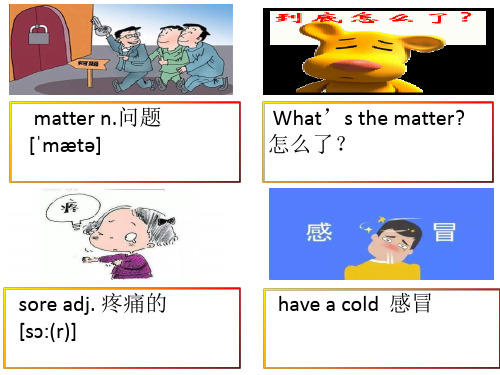
right away 立即,马上
get into 陷入,参与
herself pron. 她自己 [hə:ˈself]
bandage n. & v. 绷带 ['bændɪdʒ]
press
v.压
[pres]
sick adj. 患病的 [sɪk]
knee n. 膝盖 [ni:]
nosebleed n. 鼻出血 [ˈnəʊzbli:d]
accident n. 意外事件 [ˈæksidənt]
Hale Waihona Puke situation n. 状况 [ˌsitjuˈeiʃən]
kg=kilogram n. 公斤 [ˈkɪləgræm]
rock n. 岩石 [rɔk]
run out (of) 用尽
knife n. 刀 [naif]
cut off 切除
blood n. 血 [blʌd]
stomach n. 胃 ['stʌmək]
throat n. 喉咙 [θrəʊt]
fever n. 发烧, ['fi:və] have a fever 发烧
lie v. 躺 [laɪ] lie down 躺下
rest n. & v放松,休息 [rest]
cough n. & v. 咳嗽 [kɒf]
X-ray n. X光 ['eksreɪ]
toothache n. 牙痛 [ˈtu:θeɪk]
take one's temperature 量体温
headache n. 头痛 [ˈhedeɪk]
break n. & v. 休息 [breɪk]
take breaks (take a break) 休息
八下第一单元单词
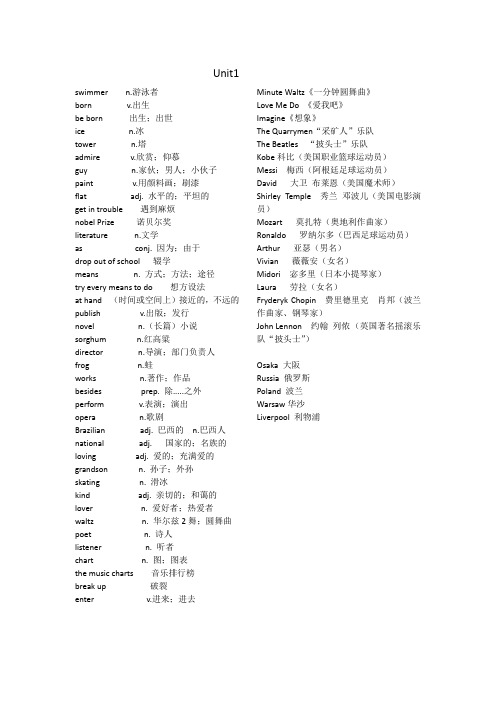
Unit1swimmer n.游泳者born v.出生be born 出生;出世ice n.冰tower n.塔admire v.欣赏;仰慕guy n.家伙;男人;小伙子paint v.用颜料画;刷漆flat adj. 水平的;平坦的get in trouble 遇到麻烦nobel Prize 诺贝尔奖literature n.文学as conj. 因为;由于drop out of school 辍学means n. 方式;方法;途径try every means to do 想方设法at hand (时间或空间上)接近的,不远的publish v.出版;发行novel n.(长篇)小说sorghum n.红高粱director n.导演;部门负责人frog n.蛙works n.著作;作品besides prep. 除.....之外perform v.表演;演出opera n.歌剧Brazilian adj. 巴西的n.巴西人national adj. 国家的;名族的loving adj. 爱的;充满爱的grandson n. 孙子;外孙skating n. 滑冰kind adj. 亲切的;和蔼的lover n. 爱好者;热爱者waltz n. 华尔兹2舞;圆舞曲poet n. 诗人listener n. 听者chart n. 图;图表the music charts 音乐排行榜break up 破裂enter v.进来;进去Minute Waltz《一分钟圆舞曲》Love Me Do 《爱我吧》Imagine《想象》The Quarrymen“采矿人”乐队The Beatles “披头士”乐队Kobe科比(美国职业篮球运动员)Messi 梅西(阿根廷足球运动员)David 大卫布莱恩(美国魔术师)Shirley Temple 秀兰邓波儿(美国电影演员)Mozart 莫扎特(奥地利作曲家)Ronaldo 罗纳尔多(巴西足球运动员)Arthur 亚瑟(男名)Vivian 薇薇安(女名)Midori 宓多里(日本小提琴家)Laura 劳拉(女名)Fryderyk Chopin 费里德里克肖邦(波兰作曲家、钢琴家)John Lennon 约翰列侬(英国著名摇滚乐队“披头士”)Osaka 大阪Russia 俄罗斯Poland 波兰Warsaw华沙Liverpool 利物浦。
Unit1 单词详解 人教版八年级英语下册
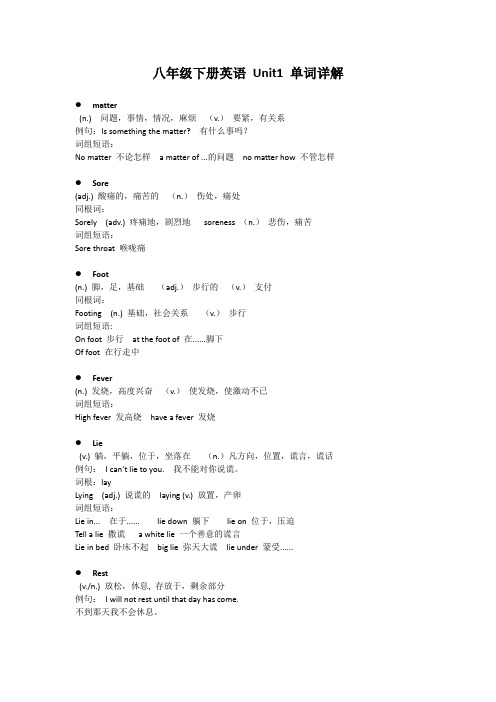
八年级下册英语Unit1 单词详解●matter(n.) 问题,事情,情况,麻烦(v.)要紧,有关系例句:Is something the matter? 有什么事吗?词组短语:No matter 不论怎样 a matter of ...的问题no matter how 不管怎样●Sore(adj.) 酸痛的,痛苦的(n.)伤处,痛处同根词:Sorely (adv.) 疼痛地,剧烈地soreness (n.)悲伤,痛苦词组短语:Sore throat 喉咙痛●Foot(n.) 脚,足,基础(adj.)步行的(v.)支付同根词:Footing (n.) 基础,社会关系(v.)步行词组短语:On foot 步行at the foot of 在......脚下Of foot 在行走中●Fever(n.) 发烧,高度兴奋(v.)使发烧,使激动不已词组短语:High fever 发高烧have a fever 发烧●Lie(v.) 躺,平躺,位于,坐落在(n.)凡方向,位置,谎言,谎话例句:I can’t lie to you. 我不能对你说谎。
词根:layLying (adj.) 说谎的laying (v.) 放置,产卵词组短语:Lie in... 在于...... lie down 躺下lie on 位于,压迫Tell a lie 撒谎 a white lie 一个善意的谎言Lie in bed 卧床不起big lie 弥天大谎lie under 蒙受......●Rest(v./n.) 放松,休息, 存放于,剩余部分例句:I will not rest until that day has come.不到那天我不会休息。
[补充]Not...until... 直到......才......同根词:Restless (adj.) 不安宁的,得不到满足的Resrlessly (adv.)不安地,慌张地rester(n.)休息的人词组短语:The rest of 其余的,剩下的at rest 静止,休息Have a rest 休息一会儿= take a restRest upon 依赖于,取决于= depend on = depend upon Rest room 休息室●Hurt(v.) 受伤,损害(adj. )受伤的,痛苦的(n.) 委屈,心灵创伤例句:She hurt herself. 她弄伤了自己。
八年级英语下册Unit 1~5重点短语归纳整理

八年级英语下册Unit 1~5重点短语归纳整理Unit11.have a fever 发烧2.have a cough 咳嗽3.have a toothache 牙疼4.talk too much 说得太多5.drink enough water 喝足够的水6.have a cold 受凉;感冒7.have a stomachache 胃疼8.have a sore back 背疼9.have a sore throat 喉咙痛10. take risks 冒险11.hot tea with honey 加蜂蜜的热茶12.see a dentist 看牙医13.get an X-ray 拍X 光片14.take one’ s temperature 量体温15.put some medicine on sth. 在……上面敷药16. give up 放弃17. sound like 听起来像18. all weekend 整个周末19. in the same way 以同样的方式20. go to a doctor 看医生21. go along 沿着……走22. on the side of the road 在马路边23. shout for help 大声呼救24. without thinking twice 没有多想25. get off 下车26. have a heart problem 有心脏病27. to one’ s surprise 另某人惊讶的是28. thanks to 多亏了;由于29. in time 及时30. make a decision 做出决定31. get into trouble 造成麻烦32. right away 立刻;马上33. because of 由于34. get out of 离开;从……出来35. keep on doing sth. 继续或坚持做某事36. put a bandage on sth. 用绷带包扎37. fall down 摔倒38. feel sick 感到恶心39. have a nosebleed 流鼻血40. cut his knee 割伤他的膝盖41. put her head back 把她的头向后仰42. have problems breathing 呼吸困难43. mountain climbing 登山运动44. be used to doing sth. 习惯做某事45. run out (of) 用完;用尽46. so that 以便47. so...that... 如此……以至于...…48. be in control of 掌管;管理49. in a difficult situation 在闲境中Unit21.Clean-Up Day 清洁日2. an old people’s home 养老院3. help out with sth. 帮助解决困难4. used to 过去常常......5. care for 关心;照顾6. the look of joy 快乐的表情7. at the age of 在......岁时8.clean up 打扫(或清除)干净9. cheer up (使)变得更高兴;振奋10. give out 分发;散发11. come up with 想出;提出12. make a plan 制订计划13. make some notices 做些公告牌14. try out 试用;试行15. work for 为…工作;为…. 效力16. put up 建造;举起;张贴17. hand out 分发;散发;发给18. call up 打电话;召集19. put off 推迟;延迟20. for example 比如;例如21. raise money 筹钱;募捐22. take after 与......相像;像23. give away 赠送;捐赠24. fix up 修理;修补;解决25. be similar to 与……相似26. set up 建立;设立27. disabled people 残疾人28. make a difference 影响;有作用29. be able to 能够30. after-school reading program 课外阅读项目Unit31.go out for dinner 出去吃饭2.stay out late 在外面待到很晚3.go to the movies 去看电影4.get a ride 搭车5.work on 从事6.finish doing sth. 完成做某事7.clean and tidy 干净整洁的8.do the dishes 洗餐具9.take out the rubbish 倒垃圾10.fold your/the clothes 叠衣服11.sweep the floor 扫地12.make your/the bed 整理床铺13.clean the livng room 打扫客厅14.no problem 没问题15.welcome sb. 欢迎某人e home from school/work放学/下班回家17.throw down 扔下18.sit down 坐下e over 过来20.take sb. for a walk 带某人去散步21.all the time 一直;总是22.all day/evening 整曰/夜23.do housework 做家务24.shout back 大声回应25.walk away 走开26.share the housework 分担家务27.a comfortable home 一个舒适的家28.in surprise 惊讶地29.get something to drink 拿点喝的东西30.watch one show 观看一个节目31.hang out 闲逛32.pass sb. sth. 把某物传给某人33.lend sb. sth. 把某物借给某人34.get sth. wet 使某物弄湿35. hate to do sth. 讨厌做某事36. do chores 做杂务37.help sb. (to ) d o /with sth帮助某人干某事38.bring a tent带顶帐篷来39.buy some snacks买些小吃40.go to the store去商店41.invite sb. to a party邀请某人参加聚会42.make sb. do sth. 使某人做某事43.enough stress足够的压力44.a waste of time浪费时间45.in order to为了46.get good grades取得好成绩47.mind doing sth. 介意做某事48.depend on依赖;依靠49.develop children ’ s independence发展孩子的独立性50.look after/take care of 照顾;照看51.do one’ s part in (doing ) sth. 做某人分内的事Unit41.have free time有空闲时间2.allow sb. to do sth. 允许某人做某事3.hang out with sb. 与某人闲逛4. after-school classes课外活动课5. get into a fight with sb.与某人吵架/打架6. until midnight直到半夜7. talk to sb. 与某人交谈8. too many太多9. study too much学得过多10. get enough sleep有足够的睡眠11. write sb. a letter给某人写信12. call sb. up打电话给某人13. surprise sb. 令某人惊讶14. look through翻看15. be angry with sb. 生某人的气16. a big deal重要的事17. work out成功地发展;解决18. get on with与...相处19. fight a lot经常吵架/打架20. hang over笼罩21. refuse to do sth. 拒绝做某事22. offer to do sth. 主动提出做某事23. so that以便24. mind sb. doing sth. 介意某人做某事25. all the time一直26. in future今后27. make sb. angry使某人生气28. worry about sth. 担心某事29. copy one’ s homework抄袭某人的作业30. be oneself做自己31. family members 家属;家庭成员32. spend time alone独自消磨时光33. give sb. pressure给某人施压34. have a fight with sb. 与某人吵架35. compete with sb. 与某人竞争36. free time activities业余活动37. get better grades取得更好的成绩38. give one’ s opinion提出某人的观点39. learn exam skills学习应试技巧40. practice sports体育训练41. cause stress造成压力42. cut out删除Unit51.make sure 确信;确认2.beat against... 拍打……3. fall asleep 进人梦乡;睡着4. die down 逐渐变弱;逐渐消失5. wake up 醒来6. in a mess 一团糟7. break...apart 使……分离8. in times of difficulty 在困难的时候9. at the time of 当.......时候10. go off (闹钟)发出响声11. take a hot shower 洗热水澡12. miss the bus 错过公交车13. pick up 接电话14. bring... together 使……靠拢15. in the area 在这个地区16. miss the event 错过这个事件17. by the side of the road 在路边18. the Animal Helpline 动物保护热线19. walk by 走路经过20. make one’s way to.... 在某人去……的路上21. hear the news 听到这个消息22.important events in history 历史上的重大事件23.for example 例如24.be killed 被杀害25. over 50 50多(岁)26. a school pupil 一个小学生27. on the radio 通过广播28.in silence 沉默;无声29.more recently 最近地;新近30.the World Trade Center 世贸中心31.take down 拆除;摧毁32.have meaning to 对……有意义33.remember doing sth. 记得做过某事34.at first 首先;最初。
2018年新版人教版八年级下册英语UNIT 1单词表(含音标)
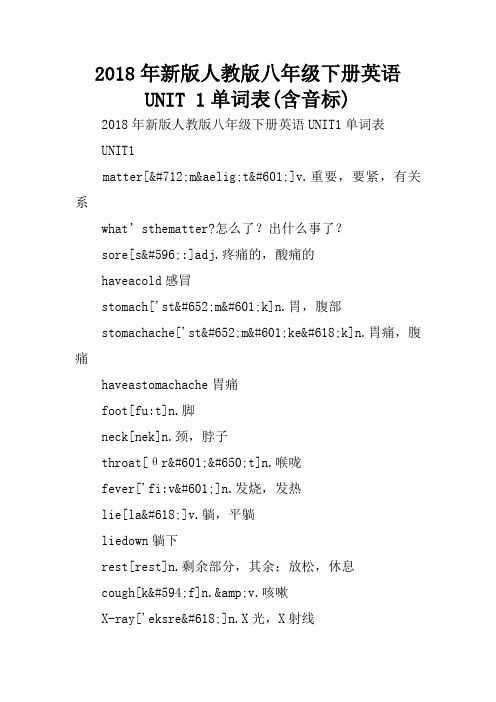
2018年新版人教版八年级下册英语UNIT 1单词表(含音标)2018年新版人教版八年级下册英语UNIT1单词表UNIT1matter[ˈmætə]v.重要,要紧,有关系what’sthematter?怎么了?出什么事了?sore[sɔ:]adj.疼痛的,酸痛的haveacold感冒stomach['stʌmək]n.胃,腹部stomachache['stʌməkeɪk]n.胃痛,腹痛haveastomachache胃痛foot[fu:t]n.脚neck[nek]n.颈,脖子throat[θrəʊt]n.喉咙fever['fi:və]n.发烧,发热lie[laɪ]v.躺,平躺liedown躺下rest[rest]n.剩余部分,其余;放松,休息cough[kɒf]n.&v.咳嗽X-ray['eksreɪ]n.X光,X射线toothache[ˈtu:θeɪk]n.牙痛takeone'stemperature量体温headache[ˈhedeɪk]n.头痛haveafever发烧break[breɪk]n.&v.休息,暂停;打破takebreaks]n.登山者beusedto习惯于…适应于…risk[rɪsk]n.&v.风险,危险;冒险takerisks冒险accident[ˈæksidənt]n.意外事件;事故situation[ˌsitjuˈeiʃən]n.状况,形式,情况kg=kilogram[ˈkɪləgræm]n.公斤,千克rock[rɔk]n.岩石runout用尽,耗尽knife[naif]n.刀,餐刀cutoff切除blood[blʌd]n.血mean[mi:n]v.意味着,意思是,意欲getoutof离开,从…出来importance[ɪmˈpɔ:tns]n.重要性decision[dɪ'sɪʒn]n.决心,决定,抉择control[kən'trəʊl]v.控制,支配,操纵beincontrolof掌管,管理spirit['spɪrɪt]n.勇气,意志death[deθ]n.死亡giveup放弃nurse[nə:s]n.护士。
八年级英语下册Unit1 知识梳理(重要句型、重点单词、短语解析及练习)

八年级英语下册Unit1 知识梳理(重要句型、重点单词、短语解析及练习)课文翻译:Section A 会话Role-play the conversation. 角色扮演对话。
Lisa, are you OK? 丽莎,你还好吗?I have a headache and I can't move my neck. 我头痛,我的脖子不能动了。
What should I do? 我头痛,我的脖子不能动了。
Should I take my temperature? 我应该测测体温吗?No, it doesn't sound like you have a fever. 不,你看起来不像是发烧了。
What did you do on the weekend? 你周末做什么了?I played computer games all weekend. 我整个周末都在玩电脑游戏。
That's probably why. 这可能就是你头痛的原因了。
You need to take breaks away from the computer. 你需要休息并且远离电脑。
Yeah, I think I sat in the same way for too long without moving. 是的,我想我是因为以同样的姿势坐的太久没有动。
I think you should lie down and rest. 我想你应该躺下休息。
If your head and neck still hurt tomorrow, then go to a doctor. 如果明天你的头部和颈部还疼,再去看医生。
OK. Thanks, Mandy. 好。
谢谢你,曼蒂。
Section A 短文Read the passage. 阅读下面的短文。
Do you think it comes from a newspaper or a book? 你认为这篇短文是出自一份报纸还是一本书?How do you know? 你是怎么知道的?Bus Driver and Passengers Save an Old Man 公交车司机和乘客救了一位老人At 9:00 a.m. yesterday, bus No. 26 was going along Zhonghua Road when the driver saw an old man lying on the side of the road. 在昨天上午9点,当司机看到一位老人躺在路边,26路公交车正在沿中华路行驶。
人教版八年级英语下册 Unit1 What's the matter单词讲解
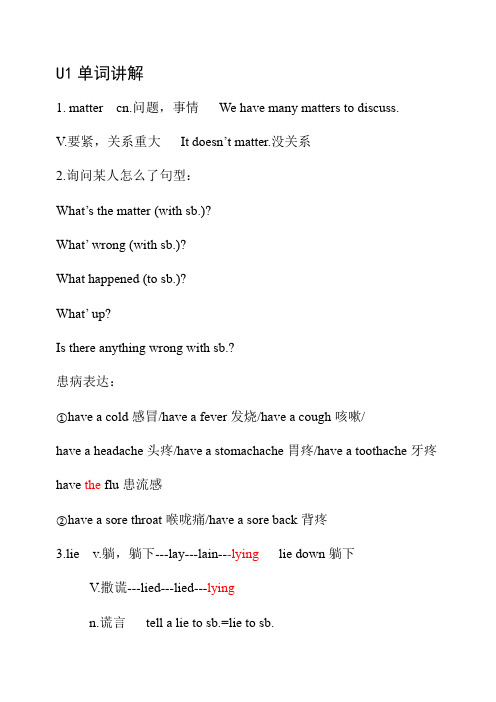
U1单词讲解1.matter cn.问题,事情We have many matters to discuss.V.要紧,关系重大It doesn’t matter.没关系2.询问某人怎么了句型:What’s the matter (with sb.)?What’ wrong (with sb.)?What happened (to sb.)?What’ up?Is there anything wrong with sb.?患病表达:①have a cold感冒/have a fever发烧/have a cough咳嗽/have a headache头疼/have a stomachache胃疼/have a toothache牙疼have the flu患流感②have a sore throat喉咙痛/have a sore back背疼3.lie v.躺,躺下---lay---lain---lying lie down躺下V.撒谎---lied---lied---lyingn.谎言tell a lie to sb.=lie to sb.4.rest n.休息&v.休息rest=have a restadj.剩余的the rest of...5.break n.休息take a break=take breaksv.①打破break the window ②违背break the law/rulebreak up打碎break down出故障break out爆发break into闯入6.get off下车---get on上车(空间大:bus)get in上车----get out of下车(空间小:car)7.trouble n.问题,苦恼have trouble/difficulty/problems(in) doing sth.eg:I have trouble in learning English.get into trouble陷入麻烦get out of trouble摆脱麻烦V.麻烦trouble sb. to do sth.麻烦某人做某事8.right away立即,马上=at once=right now=immediately9.sick adj.生病的,有病的be sick=be ill 但是ill只能做表语adj.恶心的,厌倦的feel sick感到恶心10.b reathe v.呼吸---breath n.呼吸take a deep breath深呼吸11.b e used to doing习惯于做某事used to do过去常常做某事be used to do被用来做某事eg:I used to drive to work,but now I am used to taking a bus.12.r isk v.冒险risk doing冒险做某事n.风险,危险take a risk=take risks13.accident n.事故----accidental adj.意外的---accidently adv.意外地14.sb. run out of sth.用完,用尽sth. run out15.cut---cut---cut---cuttingcut off切除cut up切碎cut down砍倒,减少cut out删除,剪下cut in插嘴16.m ean---meant---meantmean to do打算做某事mean doing意味着做某事meaning n.意思What’s the meaning of...?=What does ... mean?=What do you mean by...?meaningful adj.有意义的---meaningfully adv.meaningless adj.无意义的---meaninglessly adv.17.i mportant n.重要性---important adj.重要的the importance of... ...的重要性18.d ecision n.决定---decide v.决定decide to do=make a decision to do19.c ontrol控制,管理---controlled---controlledbe in control在控制下be out of control失去控制20.d eath n.死,死亡---die v.死---dead adj.死了的---dying adj.垂死的eg:The dog’s death makes me sad.The dog died 3 days ago.The dog was dead when I found it.21.g ive up放弃give up doing give it/them upgive away捐赠give out分发give off发出(光、热等)give in屈服。
八年级下册英语人教版单词第一单元

八年级下册英语人教版单词第一单元全文共5篇示例,供读者参考八年级下册英语人教版单词第一单元1curly卷曲的adj./ 'ke:li/straight直的adj./ streit/tall高的adj./ tr:l/medium中等的adj./ 'mi:diem/height身高;高度n./ hait/of medium height中等身高thin瘦的adj./ win/heavy重的adj./ 'hevi/build身材n./ bild/of medium build中等身材tonight(在)今晚;(在)今夜adv.&n./ te'nait/little小的adj./ 'litl/a little一点;少量cinema电影院n./ 'sineme/ glasses眼睛n.(pl.)later以后adv.handsome英俊的adj./ 'hansem/ actor演员n./ 'akte/actress女演员n./ 'aktris/ person人n./ 'pe:sn/nose鼻子n./ neuz/blonde金黄色的adj.mouth嘴n./ mauw/round圆形的adj./ raund/face脸n./ feis/eye眼睛n./ ai/singer歌手n./ 'sine/artist艺术家n./ 'b:tist/crime犯罪活动n./ kraim/ criminal罪犯n./ 'kriminel/put放v./ put/each每个;各自adj.&pron./ i:tf/way方式;路线n./ wei/describe描述v./ di'skraib/differently不同地adv.another另一;又一adj.&pron./ e'nqte/end结尾;尽头n./ end/ in the end最后real真正的;真实的adj./ 'riel/jeans牛仔裤n.八年级下册英语人教版单词第一单元2milk挤奶v./ milk/cow奶牛n./ kau/milk a cow给奶牛挤奶horse马n./ hr:s/ride a horse骑马feed喂养;饲养v./ fi:d/feed chickens喂鸡farmer农民;农场主n./ 'fb:me/quite相当;完全adv./ kwait/quite a lot 许多anything(常用于否定句或疑问句)任何东西;任何事物pron./ 'eniwin/grow种植;生长;发育v./ greu/farm农场;务农;种田n.&v./ fb:m/pick采;摘v./ pik/excellent极好的;优秀的adj./ 'ekslent/countryside乡村;农村n./ 'kqntrisaid/in the countryside在乡下;在农村yesterday昨天adv./ 'jestedi/flower花n./ 'flaue/worry担心;担忧v.&n./ 'wqri/luckily幸运地;好运地adv./ 'lqkili/sun太阳n./ sqn/museum博物馆n./ mju:'ziem/fire火;火灾n./ 'faie/fire station消防站painting油画;绘画n./ 'peintin/exciting使人兴奋的;令人激动的adj./ ik'saitin/ lovely可爱的adj./ 'lqvli/expensive昂贵的adj./ ik'spensiv/cheap廉价的;便宜的adj./ tfi:p/slow缓慢的;迟缓的adj./ sleu/fast快地(的)adv.&adj./ fb:st/robot机器人n./ 'reubet/guide导游;向导n./ gaid/gift礼物;赠品n./ gift/all in all总的说来everything所有事物;一切pron./ 'evriwin/ interested感兴趣的adj./ 'intristid/be interested in对……感兴趣dark黑暗的;昏暗的adj./ db:k/hear听到;听见v./ hie/八年级下册英语人教版单词第一单元3noodle面条n./ 'nu:dl/mutton羊肉n./ 'mqtn/beef牛肉n./ bi:f/cabbage卷心菜;洋白菜n./ 'kabidv/potato土豆;马铃薯n./ pe'teiteu/special特色菜;特价品;特别的;特殊的n.&adj./ 'spefel/ would(表示意愿)愿意modal v./ wud/would like(表示意愿)愿意;喜欢yet(常用于否定句或疑问句)还;仍然adv./ jet/large大号的;大的adj./ lb:dv/order点菜;命令n.&v./ 'r:de/take one's order点菜size大小;尺码n./ saiz/bowl碗n./ beul/one bowl of一(大)碗...tofu豆腐n.meat(可食用的)肉n./ mi:t/ dumpling饺子n./ 'dqmplin/ porridge粥;面糊n./ 'pr:ridv/ onion洋葱n./ 'qnjen/fish鱼;鱼肉n./ fif/pancake烙饼;薄饼n./ 'pankeik/ world世界n./ we:ld/around the world世界各地answer答案;回答n.&v./ 'b:nse/ different不同的adj./ 'diferent/ cake蛋糕n./ keik/candle蜡烛n./ 'kandl/age年龄n./ eidv/make a wish许愿blow吹v./ bleu/blow out吹灭if如果conj./ if/will将要;会v./ wil/the uk英国n.candy糖果n./ 'kandi/lucky幸运的adj./ 'lqki/popular受欢迎的;普遍的adj./ 'prpjule/get popular受欢迎;流行cut up切碎idea想法;主意n./ ai'die/bring good luck to给……带来好运八年级下册英语人教版单词第一单元4 get to到达train火车n./ trein/bus公共汽车n./ bqs/subway地铁n./ 'sqbwei/take the subway乘地铁ride骑;旅程v.&n./ raid/bike自行车n./ baik/ride a bike骑自行车sixty六十nu/ 'siksti/seventy七十nu/ 'sevnti/eighty八十nu/ 'eiti/ninety九十nu/ 'nainti/hundred一百nu/ 'hqndred/ minute分钟n./ 'minit, mai'nju:t/ far远;远的adv.&adj./ fb:/ kilometer千米;公里n./ 'kilemi:te/ new新的;刚出现的adj./ nju:/ every每一;每个adj./ 'evri/every day每天by(表示方式)乘(交通工具)prep./ bai/ by bike骑自行车drive开车v./ draiv/car小汽车;轿车n./ kb:/live居住;生活v./ liv,laiv/stop车站;停止n./ strp/think of认为;想起cross横过;越过v./ krrs/river河;江n./ 'rive/many许多adj.&pron./ 'meni/ village村庄;村镇n./ 'vilidv/ between介于……之间prep./ bi'twi:n/ between and在……和……之间bridge桥n./ bridv/boat小船n./ beut/ropeway索道n./ 'reupwei/year年;岁n./ jie/afraid害怕;畏惧adj./ e'freid/like像;怎么样prep./ laik/villager村民n./ 'vilidve/leave离开;留下v./ li:v/dream梦想;睡梦;做梦n,&v./ dri:m/true真的;符合事实的adj./ tru:/come ture实现;成为现实八年级下册英语人教版单词第一单元5 rain下雨;雨水v.&n./ rein/windy多风的adj./ 'windi/cloudy多云的.adj./ 'klaudi/sunny晴朗的adj./ 'sqni/snow下雪;雪v.&n./ sneu/weather天气n./ 'wete/cook做饭v./ kuk/bad坏的;糟的adj./ bad/park公园n./ pb:k/message信息;消息n./ 'mesidv/take a message捎个口信;传话him他(he的宾格)pron./ him/could能;可以modal v./ kud/back回来;回原处adv./ bak/call back(给某人)回电话problem困难;难题n./ 'prrblem/ again再一次;又一次adv./ e'gein/ dry干燥的adj./ drai/cold寒冷的;冷的adj./ keuld/hot热的adj./ hrt/warm温暖的adj./ wr:m/visit拜访;参观v./ 'vizit/canada加拿大n./ 'kanede/ summer夏天;夏季n./ 'sqme/sit坐v./ sit/juice果汁;饮料n./ dvu:s/soon不久;很快adv./ su:n/ vacation假期n./ vei'keifen/on vacation度假hard努力地;困难的adv.&adj./ hb:d/europe欧洲n./ 'juerep/mountain高山n./ 'mauntin/country国;国家n./ 'kqntri/skate滑冰v./ skeit/snowy下雪的adj./ 'sneui/winter冬天;冬季n./ 'winte/russian俄罗斯的;俄罗斯人;俄语adj.&n./ 'rqfen/ snowman雪人n./ 'sneuman/rainy阴雨的;多雨的adj./ 'reini/。
八年级下册英语单词表unit1
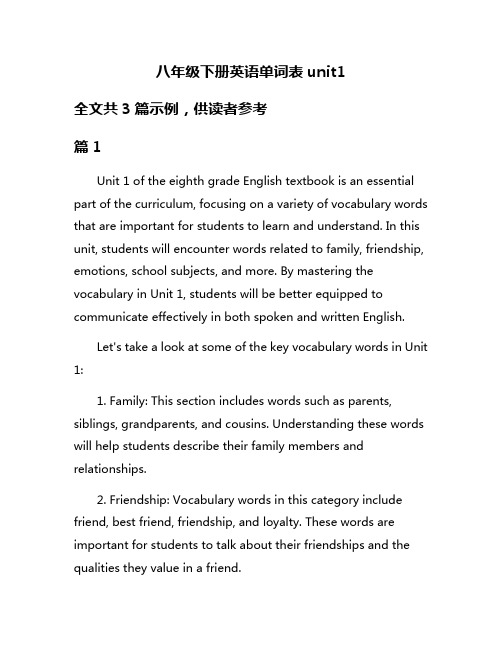
八年级下册英语单词表unit1全文共3篇示例,供读者参考篇1Unit 1 of the eighth grade English textbook is an essential part of the curriculum, focusing on a variety of vocabulary words that are important for students to learn and understand. In this unit, students will encounter words related to family, friendship, emotions, school subjects, and more. By mastering the vocabulary in Unit 1, students will be better equipped to communicate effectively in both spoken and written English.Let's take a look at some of the key vocabulary words in Unit 1:1. Family: This section includes words such as parents, siblings, grandparents, and cousins. Understanding these words will help students describe their family members and relationships.2. Friendship: Vocabulary words in this category include friend, best friend, friendship, and loyalty. These words are important for students to talk about their friendships and the qualities they value in a friend.3. Emotions: Vocabulary words related to emotions include happy, sad, angry, and excited. Being able to express and understand different emotions is crucial for effective communication.4. School subjects: This section includes words like math, science, history, and English. Knowing these words will help students talk about their favorite subjects and academic interests.5. Hobbies: Words related to hobbies include reading, drawing, listening to music, and playing sports. These words allow students to talk about their leisure activities and interests.In addition to learning the vocabulary words in Unit 1, students will also have the opportunity to practice using them in context through various exercises and activities. These activities may include matching exercises, fill-in-the-blank sentences, and role-playing scenarios. By actively engaging with the vocabulary words, students will deepen their understanding and retention of the material.Furthermore, teachers can incorporate real-life examples and scenarios to help students see the relevance of the vocabulary words in their daily lives. For example, students can practice describing their family members, talking about theirfavorite hobbies, or sharing their emotions in different situations. By making the vocabulary words relatable and practical, students will be more motivated to learn and use them effectively.Overall, Unit 1 of the eighth grade English textbook provides students with a solid foundation of key vocabulary words that are essential for developing their language skills. By mastering these words, students will enhance their ability to communicate clearly and confidently in English, both inside and outside the classroom.篇2Unit 1 is the first unit in the English vocabulary list for the eighth grade in the second semester. In this unit, students will learn a variety of new words that are essential for their English language development. The vocabulary in this unit covers a range of topics, from everyday activities and interests to advanced language concepts.Let's start by looking at some of the key words and phrases in Unit 1:1. Adore (verb) - to have a strong liking or love for someone or somethingExample: I adore my new puppy; she is so cute and playful.2. Ambition (noun) - a strong desire to achieve something or be successfulExample: Her ambition is to become a successful lawyer in the future.3. Compliment (noun) - a polite expression of praise or admirationExample: He blushed when she gave him a compliment on his outfit.4. Gradual (adjective) - happening slowly over timeExample: The plants showed gradual growth throughout the spring season.5. Hesitate (verb) - to pause before doing or saying something, usually because of uncertainty or doubtExample: She hesitated before accepting the job offer.6. Inspire (verb) - to fill someone with the desire or urge to do something creative or worthwhileExample: Her dedication to charity work inspired many others to join the cause.7. Intense (adjective) - extreme or very strong in degree or forceExample: The storm brought intense winds and heavy rain to the area.8. Resolve (verb) - to make a firm decision to do somethingExample: She resolved to study harder in order to pass her exams.9. Transform (verb) - to change in form or appearanceExample: The caterpillar transformed into a beautiful butterfly.10. Unique (adjective) - being the only one of its kind; unlike anything elseExample: Her sense of humor is unique and always brightens up the room.These are just a few examples of the words students will learn in Unit 1. By mastering this vocabulary, students will be better equipped to communicate effectively in English and expand their language skills. It is important for students to practice using these words in context to fully understand their meanings and usage.In addition to learning the definitions of these words, students can also practice spelling and pronunciation to improve their overall English language proficiency. Teachers can incorporate fun and interactive activities into their lessons to help students engage with the vocabulary and make learning more enjoyable.Overall, Unit 1 provides a solid foundation of vocabulary that will benefit students as they progress in their English language studies. By actively engaging with the words and practicing using them in everyday conversation, students can enhance their language skills and become more confident English speakers.篇3Unit 1 of the eighth grade English textbook covers a wide range of vocabulary related to travel, holidays, and family. In this unit, students will learn new words and phrases to help them talk about their own experiences and plan for future travels. Here is a comprehensive list of the vocabulary words included in this unit:1. Accommodation - a place to stay, such as a hotel or hostel2. Departure - the act of leaving, especially on a journey3. Destination - the place to which someone or something is going4. Itinerary - a plan of a journey, including the route and the places to be visited5. Luggage - bags, suitcases, and other items that travelers carry with them6. Boarding pass - a document required for boarding a plane, train, or ship7. Tourist attraction - a place that attracts tourists, such as a famous landmark or museum8. Foreign - from or relating to another country9. Exchange rate - the value of one currency in relation to another10. Travel insurance - protection against financial loss or medical expenses while travelingThese vocabulary words are essential for students to understand and use when discussing travel plans, accommodation options, and holiday activities. By learning and practicing these words, students will be better equipped to communicate in English and navigate the world of travel with confidence.In addition to learning these vocabulary words, students will also practice using them in context through various activities and exercises in the unit. They will have the opportunity to read and listen to dialogues, answer questions, and participate inrole-playing scenarios to reinforce their understanding of the vocabulary.Overall, Unit 1 of the eighth grade English textbook provides students with a solid foundation of travel-related vocabulary that will serve them well in their English language learning journey. By mastering these words and using them in daily conversations, students will be able to communicate effectively and confidently in a variety of situations, both at home and abroad.。
- 1、下载文档前请自行甄别文档内容的完整性,平台不提供额外的编辑、内容补充、找答案等附加服务。
- 2、"仅部分预览"的文档,不可在线预览部分如存在完整性等问题,可反馈申请退款(可完整预览的文档不适用该条件!)。
- 3、如文档侵犯您的权益,请联系客服反馈,我们会尽快为您处理(人工客服工作时间:9:00-18:30)。
unit1
1问题 事情
2怎么了?出什么事了?
3疼痛的酸痛的4感冒
5胃痛腹痛
6胃痛
7脚足
8颈 脖子
9胃 腹部
10咽喉 喉咙
11发烧
12躺 平躺
过去式
13躺下
14放松 休息
15咳嗽
16X射线
17牙痛
18量体温
19头痛
20发烧
21间歇休息
22休息
23使疼痛 受伤过去式
24乘客 旅客
25离开 不工作从..去掉
26下车
27使..惊讶的 出乎.意料
28向 朝
29问题 苦恼30击 打
过去式
31立即 马上32陷入 参与33她自己
34绷带,用绷带包扎
35压挤 按
36生病的 有病的37膝 膝盖
38鼻出血
39呼吸
40晒伤的
41我们自己
42攀登者
43习惯于,适应于44危险 风险 冒险45冒险
46交通事故 意外遭遇
47情况状况
48千克公斤
49岩石
50用尽 耗尽
51刀
复数
52切除
53血
54意思是 打算过去式
55离开 从.出来56重要性 重要57决定 抉择
58限制 约束
59掌管管理
60勇气意志
61死 死亡
62放弃
63护士。
